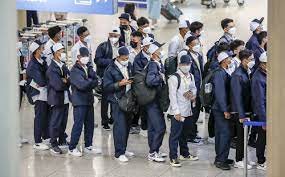Korean Corporate Culture Discomfits Foreign Workers
By wchung | 08 May, 2025
As the number of foreign workers in Korea reaches the 50,000 mark, cultural frictions are becoming a source of concern for corporations seeking to expand their foreign workforces to keep up with global ambitions.
The number of foreign workers registered in Korea has grown from 34,538 in 2007 to 47,774 in 2011, according to JoongAng Ilbo. About 22,435 are English teachers. If the trend at Samsung, Korea’s leading conglomerate, is any indication, the population of foreign workers will grow to many times that number in the next decade.
Samsung Electronics only began hiring foreigners for its home office in early 2000. From just 100 that year, its force of foreign employees grew to 600 in 2008 and 1,000 this year. At Samsung Engineering — which has one of the highest ratios of foreign workers among all major corporations — 9% of its 8,800 employees come from 34 foreign nations.
The foreign workers are increasingly seen as indispensable to Korean businesses seeking to expand globally. Hiring foreigners who have studied in Korea is seen as an efficient way to recruit workers who can be sent to staff overseas sales and marketing positions, especially in emerging nations that lack an abundant supply of workers with the requisite degree of sophisticated training.
While a study by JoongAng Daily found that foreign workers are “mostly satisfied” with conditions at Korean firms, they nevertheless experience frictions that hinder their ability to feel completely at home.
A 27-year-old man from Bangladesh who graduated from Seoul National University has struggled to adapt to Korea’s hoesik after-work drinking culture.
“Having drinks with seniors can be a good chance to get to know each other, but it is not comfortable at all because older people at the company force us to drink,” he complained.
Even after adapting to the after-hours drinking, the Bangladeshi feels stymied by other cultural differences. He has become fluent in Korean but is sometimes baffled by slang terms or situational nuances.
“One of my seniors yelled at me because I made a mistake after misunderstanding his words. “I also found it difficult to understand why Koreans often lose their temper while working.”
A 25-year-old marketer from Kenya working at a major electronics company said he has little trouble with communications because most Koreans speak enough English. He has also adjusted comfortably to the food and culture outside of work. But he complained about the seniority system that prevails at Korean companies.
“Those who entered earlier have all the power, which I totally don’t understand,” he said. “I am not free at work. It is like I am in the military because I have to kind of obey the people who joined the company earlier than me.”
He expressed hatred for the “forceful” atmosphere at the office.
A 30-year-old Chinese man working at a major conglomerate disliked Korean working hours.
“I like that Koreans work speedily and pursue perfection, but what I don’t understand is that people tend to work late,” he said. He was also disturbed that workers can’t feel free to go home before their superiors.
The sense of cultural conflict isn’t limited to the foreign workers.
“From the outside, it seems like Korean and foreign employees work in harmony, but that’s not the truth,” said a Korean executive at a local construction company. “Due to cultural differences and difficulties with communication, internal conflicts are getting serious between Koreans and non-Koreans.”
In hopes of minimizing such conflicts Korean firms are implementing programs designed to make foreigners feel more welcome and appreciated.
Samsung Electronics has installed a Global Help Desk to provide helpwith everything from visas to finding housing and grocery shopping. The company provides Korean language classes and requires all internal documents to be written in English as well as in Korean.
Earlier this year it opened a new cafeteria offering Vietnamese, Middle Eastern and Indian cuisines, among others. A special chef even prepares halal meat for those who practice Islam. The company also provides a prayer room.

Asian American Success Stories
- The 130 Most Inspiring Asian Americans of All Time
- 12 Most Brilliant Asian Americans
- Greatest Asian American War Heroes
- Asian American Digital Pioneers
- New Asian American Imagemakers
- Asian American Innovators
- The 20 Most Inspiring Asian Sports Stars
- 5 Most Daring Asian Americans
- Surprising Superstars
- TV’s Hottest Asians
- 100 Greatest Asian American Entrepreneurs
- Asian American Wonder Women
- Greatest Asian American Rags-to-Riches Stories
- Notable Asian American Professionals

